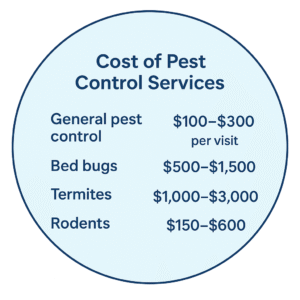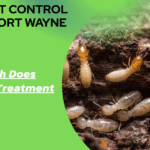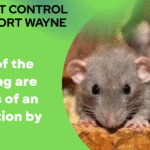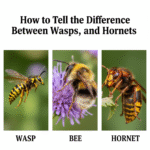Pests are more than just an annoyance—they can threaten your health, damage your property, and create long-term stress if not handled properly. From cockroaches in the kitchen to termites in the foundation, pest problems require professional expertise. That’s where exterminators and pest control professionals come in.
But what do exterminators really do? What can you expect during a visit? And is there a difference between an exterminator and a pest control professional? In this guide, we’ll answer these questions and more so you can understand exactly how these services protect your home or business.
What Do Exterminators Do?
At the most basic level, exterminators are professionals trained to identify, eliminate, and prevent pests. While many people picture an exterminator with a spray tank walking around the house, the modern pest control industry has evolved far beyond that.
An exterminator’s responsibilities typically include:
-
Inspection: Carefully examining the property to determine what pests are present, where they’re coming from, and how severe the infestation is.
-
Treatment: Using targeted methods—whether chemical sprays, traps, bait stations, or eco-friendly options—to eliminate the pest problem.
-
Prevention: Offering advice and services that keep pests from coming back, such as sealing entry points, ongoing monitoring, and follow-up visits.
Unlike DIY sprays from the store, exterminators use regulated, professional-grade solutions and strategies that are tailored to the specific pest. Their goal isn’t just to kill what you see—it’s to address the root of the problem.
What to Expect When an Exterminator Comes
The first visit from an exterminator can feel intimidating if you’ve never hired one before. However, the process is straightforward and designed to give you peace of mind. Here’s what usually happens:
Initial Consultation: The exterminator will start by asking about your pest issue. They’ll want to know what you’ve seen, when it started, and if you’ve tried any treatments yourself.
Inspection: Next, they’ll conduct a thorough inspection of your property, both inside and outside. They’ll look for:
Entry points like cracks, gaps, or broken screens
Droppings, nests, or other signs of pest activity
Moisture or food sources that may be attracting pests
Hidden damage (especially with termites or rodents)
Discussion of Findings: Once the inspection is complete, the exterminator will explain what they found. They’ll identify the pests, the severity of the problem, and where the infestation is centered.
Treatment Plan: You’ll then be given a treatment plan that explains:
- Which methods will be used
- How long the treatment will take
- Safety considerations for children and pets
- Any prep work you may need to do before or after treatment
First Treatment: Many exterminators will perform the initial treatment on the first visit. Depending on the pest, this could involve applying sprays, setting traps, or sealing entry points.
Next Steps: Finally, they’ll explain whether follow-up visits are necessary and how long before you should expect results.
What Exactly Does an Exterminator Do?
An exterminator’s job goes far beyond simply spraying chemicals. They are trained problem-solvers who tailor their approach to each situation. Here are the key tasks they perform:
-
Identify the Pest: Correctly identifying the pest is crucial. Ants, termites, and carpenter ants may look similar but require completely different treatments.
-
Evaluate the Infestation: The exterminator determines how widespread the problem is and whether it’s localized or has spread throughout the property.
-
Select a Treatment Method: Based on the findings, the exterminator chooses the best method—chemicals, traps, fumigation, or eco-friendly alternatives.
-
Apply Treatment Safely: Professional exterminators know how to use pesticides safely, ensuring that humans, pets, and the environment are not harmed.
-
Offer Preventive Solutions: Beyond immediate treatment, exterminators may recommend sealing cracks, improving sanitation, or setting up long-term monitoring systems.
Their role is both reactive (removing pests now) and proactive (preventing future infestations).
What Does Pest Control Do on a First Visit?
The first pest control visit is one of the most important because it sets the stage for eliminating the problem. Here’s a detailed breakdown:
Thorough Inspection: The pest control technician inspects every corner of your home—basement, attic, garage, kitchen, bathrooms, and outdoor areas. They look for pest activity, nesting sites, and damage.
Explanation of Findings: After the inspection, they’ll walk you through what they found and show you the problem areas.
Customized Treatment Plan: Instead of a one-size-fits-all solution, a good pest control company creates a plan based on your pest type and level of infestation.
Initial Treatment: The first treatment usually targets both visible pests and hidden areas. This may include:
- Spraying baseboards and entry points
- Setting traps in high-activity zones
- Treating the perimeter of your property
- Addressing nests or colonies directly
Guidance for Homeowners: The exterminator will give you advice on what you should do after the treatment, such as keeping certain areas clear, storing food properly, or avoiding mopping treated surfaces for a day.
Follow-Up Scheduling: In most cases, they’ll suggest a follow-up visit in a few weeks to check progress and apply additional treatments if necessary.
Is There a Difference Between Pest Control and Exterminators?
Many people use the terms interchangeably, but there is a subtle difference:
-
Exterminator: Traditionally, exterminators focused on quickly killing pests, often using strong chemicals with little emphasis on long-term prevention.
-
Pest Control Professional: Modern pest control is more comprehensive. It emphasizes inspection, prevention, and safe treatments. Pest control professionals may use Integrated Pest Management (IPM), which combines eco-friendly solutions, exclusion techniques, and ongoing monitoring.
In short, exterminators eliminate pests, but pest control companies aim to manage and prevent infestations long-term. Today, most companies prefer the term “pest control” because it reflects a more advanced and sustainable approach.
Common Pests Exterminators Handle
Exterminators deal with a wide variety of pests. Some of the most common include:
-
Ants: Carpenter ants, odorous house ants, and fire ants.
-
Cockroaches: German roaches, American roaches, and Oriental roaches.
-
Rodents: Mice, rats, and squirrels.
-
Termites: Subterranean and drywood termites that damage wood structures.
-
Bed Bugs: Hard-to-detect pests that hide in mattresses, furniture, and cracks.
-
Spiders: Including dangerous species like black widows and brown recluses.
-
Wasps & Bees: Nests inside homes, attics, and exterior walls.
-
Mosquitoes & Fleas: Common outdoor pests that spread diseases.
Methods Exterminators Use to Control Pests
Exterminators use a variety of methods depending on the pest type:
-
Chemical Treatments: Targeted insecticides and rodenticides applied safely by licensed professionals.
-
Traps & Baits: For rodents, ants, and cockroaches.
-
Heat & Steam Treatments: Especially for bed bugs.
-
Fumigation: For large infestations, particularly termites.
-
Exclusion Techniques: Sealing cracks, fixing gaps, and eliminating entry points.
-
Eco-Friendly Options: Botanical sprays, organic products, and IPM strategies.
Benefits of Hiring a Professional Exterminator
-
Accurate Pest Identification: No guesswork—pros know what they’re dealing with.
-
Safe Treatments: Professionals use chemicals responsibly, protecting your family.
-
Cost-Effective: Prevents bigger infestations that would cost thousands.
-
Peace of Mind: Knowing pests are handled properly reduces stress.
-
Long-Term Results: With follow-ups and prevention, you avoid recurring infestations.
How to Prepare for an Exterminator Visit
-
Clean and declutter to make inspection easier.
-
Store food in sealed containers.
-
Move furniture away from walls.
-
Inform the exterminator of kids or pets in the home.
-
Provide access to basements, attics, and crawlspaces.
The Importance of Follow-Up Treatments
One visit isn’t always enough. Some pests—like bed bugs and termites—require multiple treatments. Follow-ups help:
-
Kill pests that hatch after the first treatment.
-
Monitor new activity.
-
Apply preventive barriers.
-
Ensure the problem is fully resolved.
Red Flags When Choosing an Exterminator
-
No license or certification.
-
Extremely low prices with no clear plan.
-
No guarantee of service.
-
Pushy, high-pressure sales tactics.
-
Lack of reviews or customer feedback.
Cost of Hiring an Exterminator
Costs vary based on pest type, infestation level, and property size:
-
General pest control: $100–$300 per visit
-
Bed bugs: $500–$1,500
-
Termites: $1,000–$3,000
-
Rodents: $150–$600
Recurring plans (quarterly or annual) often cost less per visit and provide ongoing protection.
Eco-Friendly Pest Control Options
More homeowners are requesting green pest control. Options include:
-
Plant-based insecticides
-
Mechanical traps instead of sprays
-
Non-toxic baits
-
Preventive sealing instead of chemical use
-
Integrated Pest Management (IPM) programs
These methods protect both your home and the environment.
Conclusion
Exterminators do much more than simply spray for bugs. They are skilled professionals who inspect, identify, treat, and prevent pest problems. Whether you’re dealing with ants, roaches, rodents, or termites, hiring a trusted pest control provider ensures your property stays safe and pest-free.
FAQs
1. What to expect when an exterminator comes?
You can expect a full inspection, explanation of findings, a treatment plan, and possibly an initial treatment during the first visit.
2. What exactly does an exterminator do?
They identify pests, apply targeted treatments, and provide preventive measures to stop pests from returning.
3. What does pest control do on a first visit?
The first visit includes inspection, discussion, initial treatment, and scheduling follow-ups if needed.
4. Is there a difference between pest control and exterminators?
Yes—exterminators traditionally focused on elimination, while pest control professionals emphasize long-term prevention and safe methods.
5. Are pest control treatments safe for kids and pets?
Yes, most modern pest control companies use safe, regulated products. You can also request eco-friendly options.
6. How often should you call an exterminator?
Quarterly visits (every 3 months) are recommended for prevention, though severe infestations may require more frequent visits.
7. How long does it take for pest control treatments to work?
It depends on the pest. You may see immediate results with roaches or ants, but termites and bed bugs can take weeks to fully eliminate.
8. Do exterminators offer guarantees if pests come back?
Yes, many companies provide warranties and free re-treatments if pests return within a set period.








